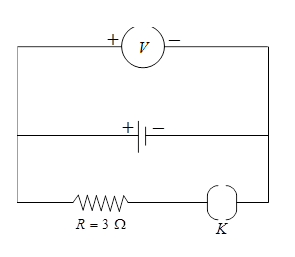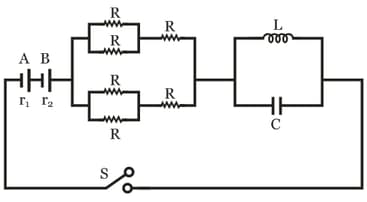Internal Resistance
Internal Resistance: Overview
This topic covers concepts, such as, Potential Difference across Terminals of Battery Getting Discharged, Determination of EMF and Internal Resistance of a cell & Maximum Current Drawn from a Cell etc.
Important Questions on Internal Resistance
The reading on a high resistance voltmeter, when a cell is connected across it, is . When the terminals of the cell are also connected to a resistance of as shown in the circuit, the voltmeter reading drops to . The internal resistance of the cell is :

Why can not we draw maximum current from the cell in real life?
What should be null for drawing maximum current from the cell?
On which of the following factors internal resistance of a cell depends:
The potential difference across the terminals of a battery which is getting charged is always:
The terminal potential difference of a battery of emf and internal resistance which is getting charged with electric current flowing through it is:
While charging a run-down battery, current flows inside it from its negative terminal to positive terminal.
A storage battery of emf with internal resistance is being charged by a supply using a series resistor of What is the terminal voltage of the battery during charging?
Two cells with the same emf and different internal resistances and are connected in series to an external resistance . The value of so that, the potential difference across the first cell be zero is,
In the circuit shown A and B are two cells of same emf , but different internal resistances and (), respectively. What is the value of in terms of and , such that the potential difference across the terminal of cell A is zero a long time after the key K is closed.

A student measures the terminal potential difference of a cell (of emf and internal resistance ) as a function of the current flowing through it. The slope and intercept, of the graph between and , then, respectively, equal:
